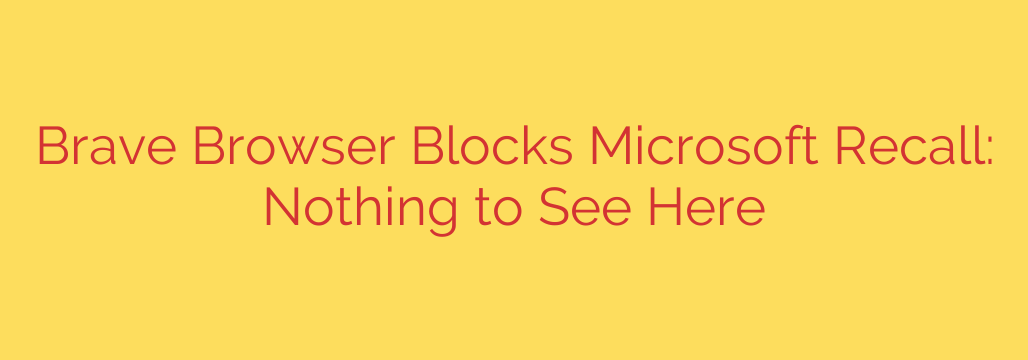
Microsoft Recall Sparks Major Privacy Concerns: How to Protect Your Data
A new feature planned for upcoming Windows PCs has ignited a firestorm of debate across the tech community, raising serious questions about the future of user privacy and data security. The feature, known as Microsoft Recall, is designed to act as a “photographic memory” for your computer, but security experts are sounding the alarm about its potential for misuse.
Recall, intended for new “Copilot+ PCs,” works by continuously taking snapshots of your screen every few seconds. It then uses AI to make this visual history searchable, allowing you to find anything you’ve ever seen or done on your device. While the goal is to enhance productivity, the underlying mechanism has been flagged as a significant security risk.
The Core Problem: A Goldmine for Hackers
The primary concern is how Recall stores your data. Security researchers quickly discovered that the database containing all these screenshots—a detailed timeline of your digital life—is stored locally on your PC in an unencrypted format.
This means if a hacker or a piece of malware gains even temporary access to your system, they could potentially steal your entire activity history. This includes:
- Passwords and login credentials typed or viewed on screen.
- Financial information from banking websites.
- Private conversations in messaging apps.
- Confidential work documents and sensitive emails.
Essentially, Recall creates a centralized, easily accessible treasure trove for cybercriminals, turning a standard malware infection into a catastrophic personal data breach.
How the Tech Community is Pushing Back
In response to the backlash, privacy-focused technology companies are already taking steps to protect their users. For example, some developers of privacy-centric web browsers have pledged to prevent Recall from capturing activity within their most secure environments.
This is a critical step, as it ensures that even if Recall is active on a system, users can still have a secure space for sensitive activities like online banking or private browsing. By using a privacy-first browser, you can significantly limit the data that Recall is able to log, adding a crucial layer of protection.
Actionable Security Tips: How to Safeguard Your PC
While Microsoft has responded to the criticism by making Recall an opt-in feature rather than on-by-default, every user should remain vigilant. Here are practical steps you can take to protect your privacy.
Disable Recall Immediately: If you purchase a new Copilot+ PC, your first step should be to go into your system settings and ensure Recall is turned off. Do not enable it unless you fully understand the risks and have robust security measures in place.
Choose Your Software Wisely: Opt for applications and web browsers that have a proven track record of prioritizing user privacy. Using the private or incognito modes in these browsers can also prevent your browsing history from being saved by the browser itself and, in some cases, logged by features like Recall.
Maintain Strong Security Hygiene: The risks associated with Recall underscore the importance of basic cybersecurity. Always keep your operating system and antivirus software up to date, use strong, unique passwords for every account, and be cautious of phishing emails or suspicious downloads that could introduce malware to your system.
Be Skeptical of “AI” Convenience: As artificial intelligence becomes more integrated into our devices, it’s vital to question what data these features are collecting. Before enabling any new AI-powered tool, take a moment to understand how it works and what information it’s storing.
Ultimately, while technological innovation can offer powerful new tools, it must not come at the cost of fundamental privacy and security. The controversy around Recall is a stark reminder that users must remain the final guardians of their own digital lives.
Source: https://go.theregister.com/feed/www.theregister.com/2025/07/23/brave_browse_block_microsoft_recall/








